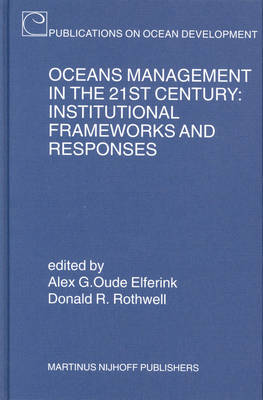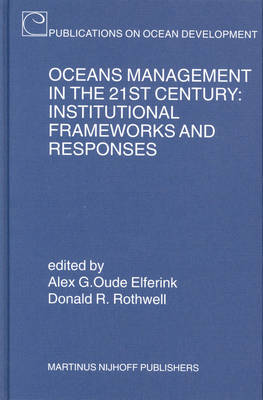
- Retrait gratuit dans votre magasin Club
- 7.000.000 titres dans notre catalogue
- Payer en toute sécurité
- Toujours un magasin près de chez vous
- Retrait gratuit dans votre magasin Club
- 7.000.0000 titres dans notre catalogue
- Payer en toute sécurité
- Toujours un magasin près de chez vous
439,95 €
+ 879 points
Description
The 1982 United Nations Convention on the Law of the Sea created a new framework for the conduct of maritime affairs. The Convention remains a shining example of international cooperation, diplomacy and the role of international law in the regulation of international affairs and oceans management. The institutions established under the Convention, which entered into force in 1994, are now all operating and the way they are fulfilling their tasks under the Convention is taking shape.
Chapters throughout this book assess the roles and impact upon oceans management of the International Tribunal for the Law of the Sea, the International Sea-Bed Authority, the Commission on the Limits of the Continental Shelf, and the Convention's Meeting of States Parties.
Institutions outside the Convention's framework are also assessed, including the International Maritime Organization in respect of the regime for archipelagic sea lanes and international straits, the Food and Agriculture Organization and regional fisheries organizations, and the United Nations General Assembly as concerns its coordinating role in the field of oceans and law of the sea. In the evolving area of oceans management, the way in which global and regional institutions have been involved in implementing the Convention on the Law of the Sea raises both questions concerning the interpretation of the Convention's substantive provisions and how these various institutions interact. The impetus to resolve these and other challenges in the law of the sea and oceans management will ensure the law of the sea's continuing evolution in the years ahead.
Chapters throughout this book assess the roles and impact upon oceans management of the International Tribunal for the Law of the Sea, the International Sea-Bed Authority, the Commission on the Limits of the Continental Shelf, and the Convention's Meeting of States Parties.
Institutions outside the Convention's framework are also assessed, including the International Maritime Organization in respect of the regime for archipelagic sea lanes and international straits, the Food and Agriculture Organization and regional fisheries organizations, and the United Nations General Assembly as concerns its coordinating role in the field of oceans and law of the sea. In the evolving area of oceans management, the way in which global and regional institutions have been involved in implementing the Convention on the Law of the Sea raises both questions concerning the interpretation of the Convention's substantive provisions and how these various institutions interact. The impetus to resolve these and other challenges in the law of the sea and oceans management will ensure the law of the sea's continuing evolution in the years ahead.
Spécifications
Parties prenantes
- Auteur(s) :
- Editeur:
Contenu
- Nombre de pages :
- 396
- Langue:
- Anglais
- Collection :
- Tome:
- n° 44
Caractéristiques
- EAN:
- 9789004138520
- Date de parution :
- 29-04-04
- Format:
- Livre relié
- Format numérique:
- Genaaid
- Dimensions :
- 155 mm x 235 mm
- Poids :
- 809 g

Les avis
Nous publions uniquement les avis qui respectent les conditions requises. Consultez nos conditions pour les avis.






